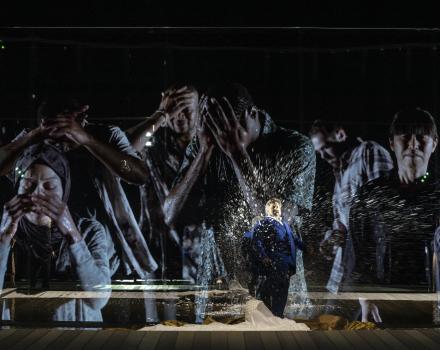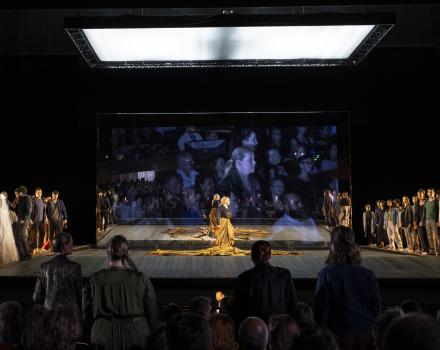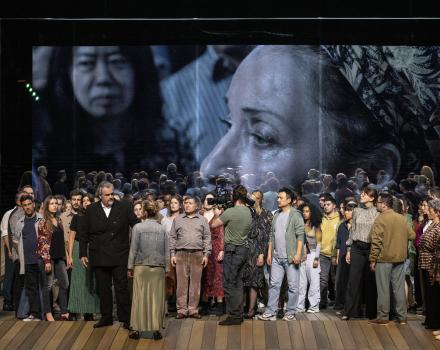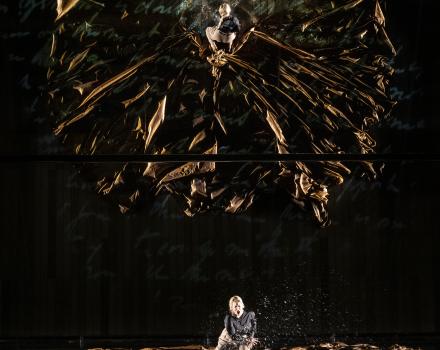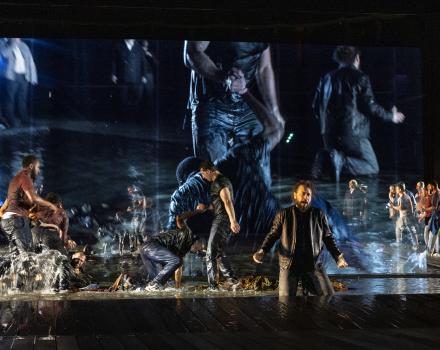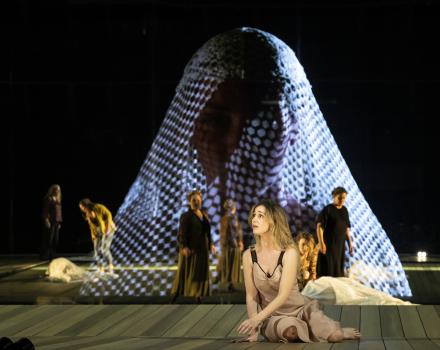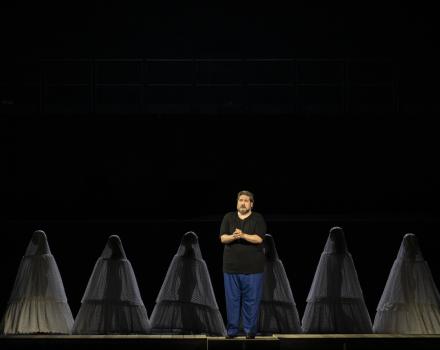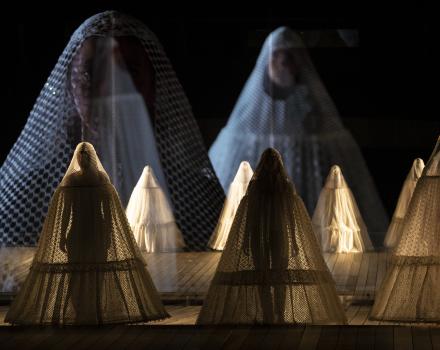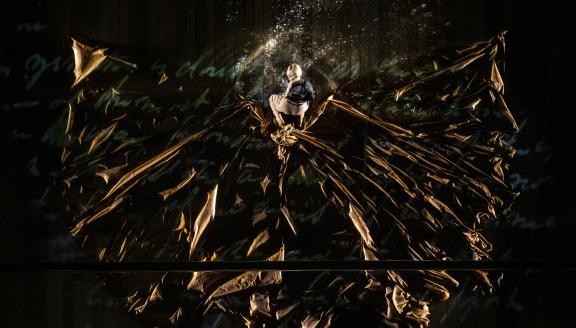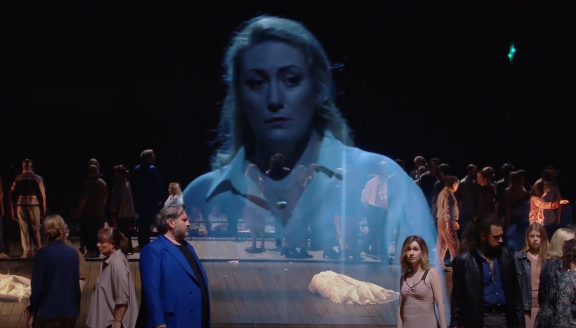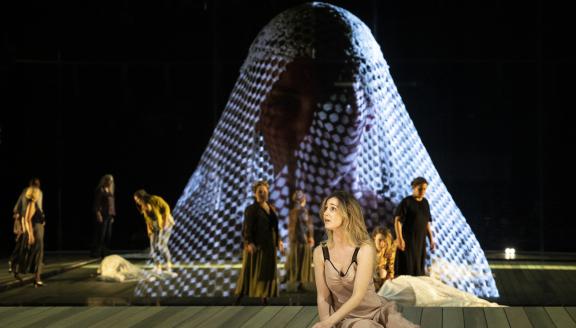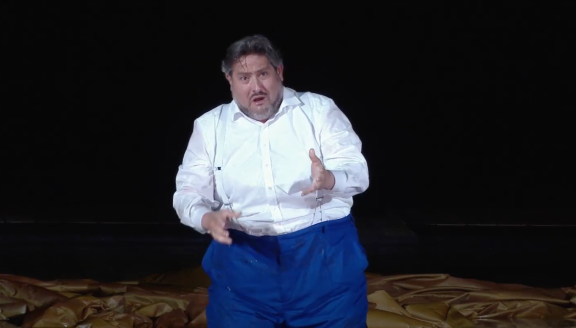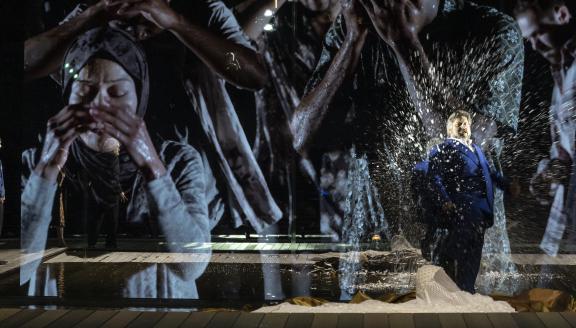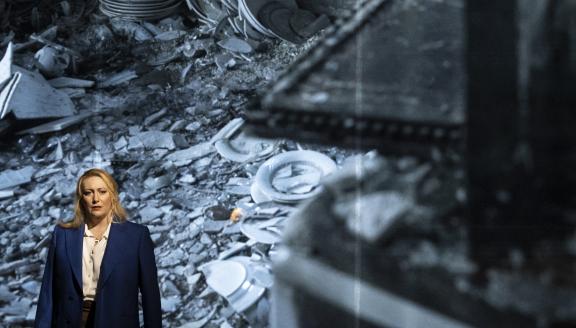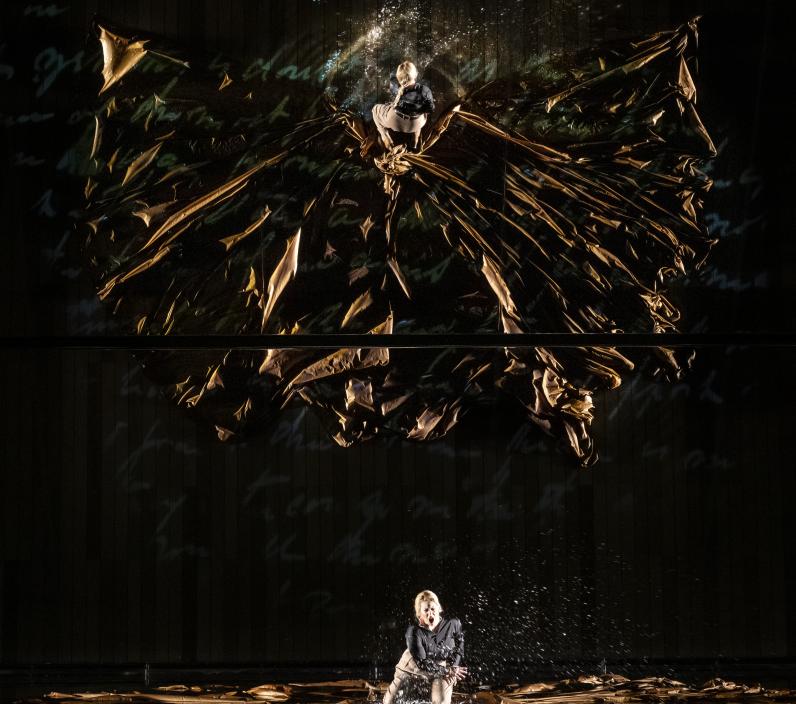
Nabucco

Politics. Religion. Nabucco is Verdi's retelling of the Old Testament story of King Nebuchadnezzar II's religious conversion. On one side, the fiery Hebrew priest Zaccaria, battling to lead his people from oppression. On the other, Nabucco, the tyrannical Babylonian king and his adopted daughter Abigaille, who will stop at nothing to get her father's throne and her sister's lover. Will King Nabucco's ambition rob him of his beloved daughter as well as his kingdom?
Nabucco was an instant success at its 1842 premiere, with the famous Chorus of the Hebrew Slaves (‘Va, pensiero’) taking on a political resonance that still echoes today. The twists and turns of this epic early opera by Giuseppe Verdi are often seen as a call to the national liberation struggle that would eventually lead to Italian unity. Exile and power, displaced populations and forced migrations are themes dear to Christiane Jatahy. The Brazilian director, filmmaker and author, who was awarded the Golden Lion for Lifetime Achievement at the Venice Biennale in 2022, gives new life to Verdi's metaphor of the Bible by introducing the words of those who still stand up to tyrants and extremist ideologies today around the world. In this hall of mirrors, in which chorus and audience are reflected, maestro Antonino Fogliani leads the Orchestre de la Suisse Romande through Geneva’s new production of Verdi’s masterpiece along with a cast of excellent bel canto singers, including Riccardo Zanellato, Nicola Alaimo and Saioa Hernández. Here is a telling of epic history to help us reflect on our world today.
CAST
|
Nabucco
|
Nicola Alaimo
|
|---|---|
|
Abigaille
|
Saioa Hernández
|
|
Zaccaria
|
Riccardo Zanellato
|
|
Ismaele
|
Davide Giusti
|
|
Fenena
|
Ena Pongrac
|
|
Anna
|
Giulia Bolcato
|
|
Abdallo
|
Omar Mancini
|
|
Il Gran Sacerdote
|
William Meinert
|
|
Orchestra
|
Orchestre de la Suisse Romande
|
|
Chorus
|
Grand Théâtre de Genève Chorus
|
| ... | |
|
Music
|
Giuseppe Verdi
|
|---|---|
|
Text
|
Temistocle Solera
|
|
Conductor and composer of the final orchestral intermezzo
|
Antonino Fogliani
|
|
Director
|
Christiane Jatahy
|
|
Sets
|
Thomas Walgrave
Marcelo Lipiani
|
|
Costumes
|
An D’Huys
|
|
Lighting
|
Thomas Walgrave
|
|
Video
|
Batman Zavarese
|
|
Photography and camera direction
|
Paulo Camacho
|
|
Video system development
|
Júlio Parente
|
|
Dramaturg
|
Clara Pons
|
|
Chorus master
|
Alan Woodbridge
|
| ... | |
In co-production with Théâtres de la Ville de Luxembourg, Opera Ballet Vlaanderen and Teatro della Maestranza of Seville.
VIDEOS
STORY
Part One
Jerusalem
In Solomon's temple, the Hebrew people implore the protection of their God against the Assyrian invasion led by Nabucco, king of Babylon. The high priest Zaccaria urges them to fight and tells them that he has taken captive Fenena, Nabucco's daughter, whom he intends to use to restore peace. Ismaele, nephew of the King of Jerusalem, arrives with disastrous news: the enemy troops have gained more ground. But Zaccaria remains confident. He hands Fenena over to Ismaele before leaving, at the head of the Hebrews, to defend the temple. Left alone, Ismaele and Fenena no longer conceal their tender feelings. He reminds her how she helped him escape from a Babylonian prison when he was an emissary to Nabucco's court, and now wants to return the favour and run away with her.
They are interrupted by Abigaille, Fenena's malevolent sister: Jerusalem has fallen, the Hebrews are defeated. Abigaille, also in love with Ismaele, offers to save his people if he gives her his heart. Ismaele refuses and Fenena, overwhelmed by such heroism, abruptly converts to the God of the Hebrews. The people return in panic, preceding a triumphant Nabucco. Cornered, Zaccaria threatens to execute Fenena, who implores her father to have mercy on his enemies. But it is Ismaele who stands between her and the knife and saves his beloved. Nabucco's anger can then be unleashed: he orders the destruction of the temple and the enslavement of the Hebrews, while Zaccaria curses Ismaele, traitor to his people.
Part Two
Impiety
In the royal palace in Babylon, Abigaille has just made a disastrous discovery: a document proves that she is not really the daughter of Nabucco but a child of slaves. The High Priest of Baal enters and informs Abigaille that Fenena is about to free the Hebrew slaves. It is, therefore, time to accelerate the plan that will put Abigail on the throne. To do this, he has already spread the rumour of Nabucco's death on a battlefield. Elsewhere in the palace, Zaccaria pleads with God to inspire him to free his people, while Ismaele, an outcast among his own people, must answer for his treachery. It is Anna, Zaccaria's sister, who justifies him: Fenena having converted to the God of the Hebrews, Ismaele has not saved an enemy but one of their own.
Abdallo, Nabucco's faithful officer, urges Fenena to flee. The rumour of the king's death has led the Babylonians to rally behind Abigaille, supported by the High Priest. She refuses to return the crown to Fenena when Nabucco appears and angrily states that from now on, he will not tolerate either the God of the Hebrews or those of the Babylonians: all must revere only... him. He also condemns the Hebrews to death, prompting Fenena to reveal her conversion. A bolt of lightning then strikes Nabucco, knocking the crown off his head and driving him mad. Zaccaria cries out for divine punishment and Abigaille seizes the crown.
Part Three
The Prophecy
In the Hanging Gardens of Babylon, Abigaille sits on her throne by the statue of the god Baal and receives the tributes of her subjects. The High Priest asks her to hasten the slaughter of the Hebrews and Fenena. Abigaille pretends to hesitate, when Nabucco enters, disoriented, with shaggy beard and tattered clothes. Abigaille treats him with contempt, then tells him to sign the deed of condemnation. Nabucco signs but asks about the fate of his daughter. Abigaille replies that no one can save Fenena, prompting Nabucco to threaten to reveal her condition as a slave through a document. But Abigaille tears it to pieces in front of Nabucco's eyes as trumpets sound announcing the imminent execution of the Hebrews. Nabucco tries one last time to save Fenena, offering Abigaille the throne in exchange for his daughter's life. But the new queen disdainfully refuses and has this ‘shadow of a king’ arrested.
On the banks of the Euphrates, the enslaved and enchained Hebrews sing of their lost homeland, which they visit in thought for want of being able to return there. But Zaccaria urges them to stop lamenting and to rise again. He prophesies that their enemies will soon experience the fury of the Lion of Judah and that Babylon will be destroyed to the last stone.
Part Four
The Broken Idol
In the palace, Nabucco is awakened from a nightmare by cries that he takes as a call to war. But it is in fact the noise of the people calling for Fenena's death. Imprisoned and powerless, Nabucco turns to the God of the Hebrews and asks for forgiveness. If he saves his daughter, he will acknowledge him as the true God and rebuild the temple in Jerusalem. The miraculous arrival of Abdallo and a troop of soldiers seals the vow. Nabucco sets out with them to regain his throne.
In the gardens, the Hebrews prepare to be slaughtered to the sound of a funeral march. As Zaccaria represents martyrdom to Fenena as the end of their exile and the High Priest is about to begin the sacrifice, Nabucco bursts in at the head of his troops. The statue of the god Baal falls and shatters. Nabucco announces that he is freeing the Hebrews, that the temple in Jerusalem will be rebuilt and that Abigaille, with a troubled mind, has poisoned herself. All are proclaiming the greatness of the God of the Hebrews when two soldiers enter, supporting the dying Abigaille. She asks Fenena, Ismaele and Nabucco for forgiveness, implores the God who ‘lifts up the afflicted’ and converts to Him before breathing her last. Zaccaria then declares that Nabucco, by serving Jehovah, will be King of Kings.
GALLERY
